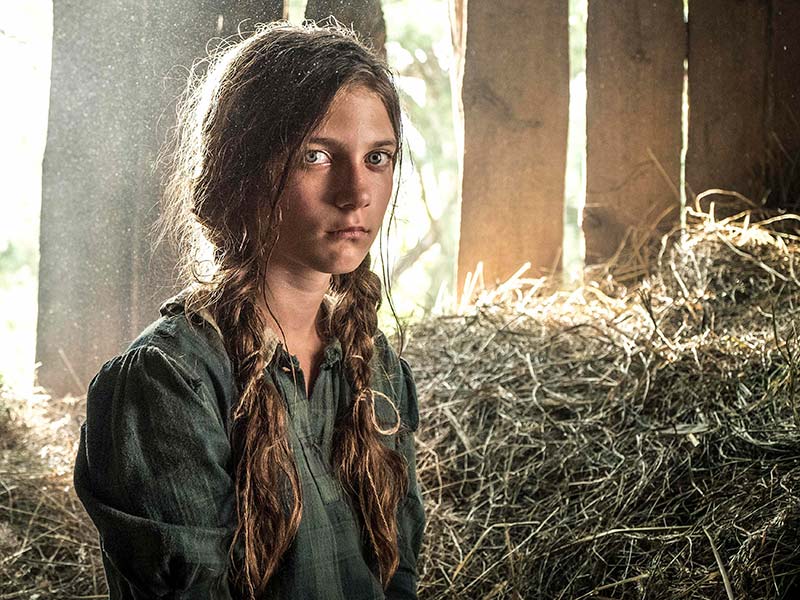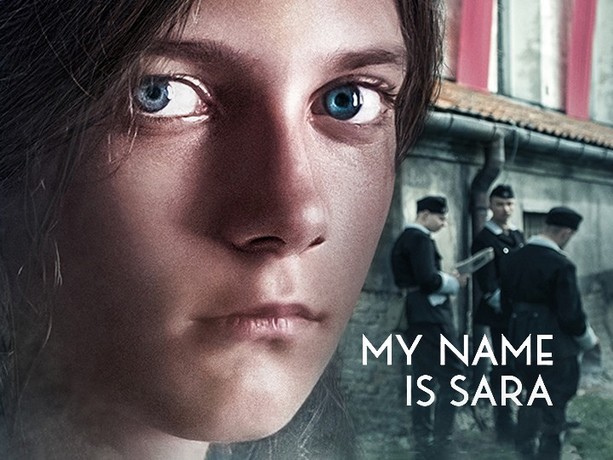‘My Name Is Sara’ Review: A Young Girl’s Lie Becomes Her Lifeline in a World at War

In My Name Is Sara, truth itself becomes a matter of survival. Based on the extraordinary true story of a 13-year-old Jewish girl who evaded the Nazis by posing as a Christian in occupied Ukraine, the film unfolds with the quiet intensity of a thriller — every gesture, glance, and silence charged with the threat of discovery.
Directed by Steven Oritt, this haunting historical drama does not rely on spectacle or sentimentality. Instead, it draws its power from restraint — from the quiet terror of a child forced to live behind a mask, and from the unsettling realization that her very survival depends on deception.
A Story Rooted in Survival
Set against the rural vastness of Nazi-occupied Ukraine, the film opens with Sara (played by Zuzanna Surowy in a remarkable debut) fleeing her hometown after her parents are seized by German forces. Alone, terrified, and desperate, she forges a new identity as a Ukrainian Orthodox orphan named Sara Goral, finding temporary refuge with a farmer and his suspicious wife.
What follows is not just a survival story but a psychological duel. Sara must blend seamlessly into a world that would destroy her if it knew who she really was. She attends church, crosses herself, recites prayers she barely understands — all while hiding the Hebrew prayers echoing in her memory.
The danger never recedes. The couple who shelter her — played with complexity by Eryk Lubos and Michalina Olszańska — are both her protectors and potential executioners. They are poor, embittered, and wary of outsiders. Sara helps with chores, tends animals, and cares for their children, but her safety depends entirely on her ability to maintain her disguise.
Living on a Knife’s Edge
Every moment of My Name Is Sara hums with quiet dread. The Nazis are not always visible, yet their presence infects every frame — in the whispers of neighbors, the sudden roar of trucks, the way a glance lingers too long.
The film’s tension comes not from explosions or gunfire but from the unbearable stillness of waiting to be found out. When Sara is asked to recite a Christian prayer, when a curious villager asks about her background, or when a Nazi patrol suddenly appears on the horizon — the air itself seems to tighten.
Cinematographer Grzegorz Hartfiel uses the Ukrainian landscape to stunning effect. The fields and forests are at once beautiful and menacing — a place of life and death, hiding and exposure. Every shaft of sunlight feels like it could betray her.
The muted palette and natural lighting recall the style of European neorealism, grounding the story in harsh authenticity. Even the silences feel real — as if the land itself holds its breath with her.
A Child Forced to Grow Up Overnight
What makes My Name Is Sara exceptional is how it refuses to simplify its heroine. Sara is not an idealized martyr or a saintly survivor. She is frightened, cunning, brave, and flawed — all at once. Her intelligence is her armor, but her loneliness is crushing.
In flashbacks, we see glimpses of her parents (played by Ksawery Szlenkier and Aleksandra Pisula), urging her to endure. “Surviving will be our revenge,” her mother tells her — a line that lingers long after the credits. Those words become a moral compass for Sara, a child forced to confront the darkest truths of humanity before she has even become a woman.
Zuzanna Surowy delivers a performance of rare emotional precision. With minimal dialogue, she conveys everything — terror, longing, resilience — through her eyes. It’s one of those rare debut performances that feels both fragile and indestructible.
More Than a Holocaust Drama

While many films have depicted survival during the Holocaust, My Name Is Sara stands out for its claustrophobic intimacy. It’s less about the war itself and more about the psychology of hiding, the dissonance between who you are and who you must pretend to be.
The film’s setting — Ukraine — adds an unexpected modern resonance. The landscape, once again a site of war and displacement, reminds viewers that the past is never entirely gone. The moral questions it raises — about fear, silence, complicity, and the cost of survival — feel chillingly current.
This isn’t a film that sensationalizes suffering. Instead, it captures the quiet, unbearable reality of living a lie for months on end — of smiling when you want to scream, of praying in the wrong language to stay alive.
A Story That Demands to Be Remembered
My Name Is Sara is not an easy watch, but it is an essential one. Oritt handles the material with care, avoiding melodrama while delivering moments of unbearable tension and emotional truth. It’s a film that asks difficult questions about morality, identity, and the will to survive when every path seems impossible.

As the story closes, Sara’s survival feels both miraculous and devastating. The lie that saved her has cost her everything — her home, her name, her childhood. Yet within that loss lies a fragile, defiant hope: that truth, once buried, can still find a way to endure.
Verdict:
A gripping, beautifully acted tale of courage and deception, My Name Is Sara is a quiet triumph of resilience — a reminder that even in humanity’s darkest moments, survival can be an act of resistance.
⭐ Rating: 4.5 / 5
🎬 Director: Steven Oritt
⭐ Cast: Zuzanna Surowy, Eryk Lubos, Michalina Olszańska, Ksawery Szlenkier, Aleksandra Pisula
📍 Genre: Historical Drama / Holocaust Thriller
🕯️ Runtime: 111 minutes
